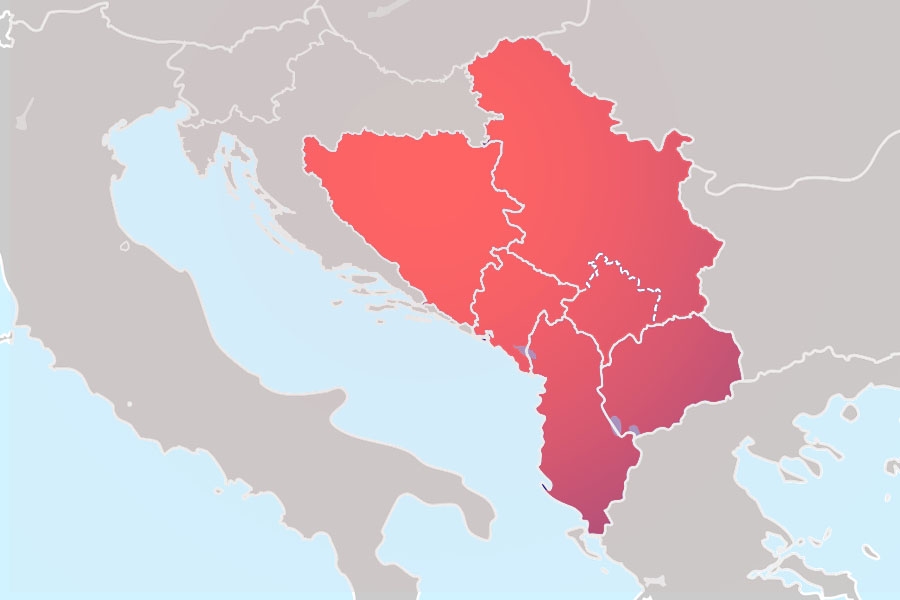Disinformation aims to blur the truth in the eyes of citizens. But an even bigger problem is their soft power, with the help of which they can cause far-reaching consequences in the region which can hardly be prevented. At the same time, they can harm democracy, the right to information, and social harmony.

Disinformation aims to blur the truth in the eyes of citizens. But an even bigger problem is their soft power, with the help of which they can cause far-reaching consequences in the region which can hardly be prevented. At the same time, they can harm democracy, the right to information, and social harmony.

In the era of social networks, information spreads quickly and easily, but with it comes the danger of fake news and misinformation penetrating all areas of society in the region and the world.
The Balkans, including Macedonia, are not exempt from this global challenge.
These unwanted social events, which simultaneously defocus the average citizen from the region and shake up societies, are mainly spread through social networks.
That is why it is worth mentioning the disturbing information that says that the social network Twitter has withdrawn from the voluntary code of the European Union (EU) to combat disinformation.
The EU Commissioner for the Internal Market, Thierry Breton, announced this news and warned Elon Musks company that he must comply with the new laws, BBC reports.
"Obligations remain. You can run, but you cant hide," Breton wrote on Twitter.
How problematic misinformation spread on social networks is for the state is evidenced by the data published on this topic by the Global Index for Disinformation - GDI.
Macedonia faces severe challenges at the global level in the fight against misinformation that affects democratic processes and the media ecosystem in the country.
In its research, the American organization, which does not rank countries on a scale as in similar publications, notes that Macedonia is a susceptible ground for misinformation due to the functioning of the media ecosystem, which mainly consists of low-professional media that have economic difficulties to survive on the market.
In addition, the publication points out that the low level of social awareness of the problem contributes to the fact that Macedonia is on the verge of being affected by this global phenomenon, which has a high and negative impact on the political and social processes in the country.
The document Global Index of Disinformation also states that the country faces the problem of preventing disinformation because state regulations to combat such events have little effect on improving the situation.
On the other hand, similar data on this topic is highlighted by the research of the organization "Reporters without Borders,” which this year ranks Macedonia in 38th place out of a total of 180 countries in the world according to the Global Media Freedom Index.
Thats a jump of 19 places compared to 2022 and 52 places compared to two years ago.
Reporters Without Borders, however, states in its document on the country that although journalists do not work in a hostile environment, widespread misinformation and lack of professionalism contribute to the decline of societys trust in the media.
In his statement on this topic, Josef Hollenburger, director of the German non-profit Center for Monitoring, Analysis, and Strategy, believes that the older generations of citizens in Europe are more susceptible to being victims of fake news and misinformation than young and middle-aged people.
According to him, the so-called "digital natives,” those who grew up with stronger media skills, can talk to older family members about the possible risks of using the Internet.
In the meantime, experts in this field agree that the fight against disinformation is difficult. Still, critical steps have been taken to create conditions for practicing the standards and principles of the professional work of journalists and the media.
Of course, there is still a lot to be done in that regard, including in the field of fact-checking and media literacy, and that is precisely the role of professional journalism.
Professional Macedonian media, through their newsrooms and experienced staff, who practice the Code of Journalists, daily crystallization of the voice of the public, the voice of the citizens, are brave civil observers of facts and correctors of public policies.
Therefore, every state has a national interest in encouraging the seventh force (the media) on behalf of citizens and creating conditions for the press to be a decisive factor in social prosperity, diagnosing and analyzing phenomena or problems, and offering solutions in the interest of citizens.
This kind of inclusive journalism is also a new trend of the seventh force, which relies on professionalism, truthfulness, detailed observation and verification of facts, expert analyses, and conclusions.
This is the journalistic approach practiced by the first Macedonian daily newspapers, with decades of tradition and accumulated experience.
Analyst Milan Stefanovski says that if you mention something often, it means you believe in it.
He said to "Slobodan Pechat" that during every primary election in every country in the Balkans, the number of fake news increases, as does the number of news in general, the number of appearances by politicians, and at the same time, we have a lot of manipulation and spin.
-This phenomenon is a normal process and is not new for us or other countries worldwide. Fake news or inaccuracies have always existed in history and will continue to exist, so the battle with them will continue. The problem is solving them, which in turn depends on the journalists themselves and downloading this information and further marketing it to the public - says Stefanovski.
At the same time, Stefanovski does not expect much from journalists because, as he says, they have shown that they have not objected to many things that have affected them personally, such as work pressures or poor working conditions.
-It is very likely that journalists will have difficulties respecting the basic principles of journalism and ethics and will not oppose releasing this information to the public, which, in turn, comes from specific centers for certain purposes. That battle must be fought at a higher level before this phenomenon can disappear, especially in this era of the Internet, when all information is available to everyone - concluded Stefanovski.
Source: https://www.slobodenpecat.mk/mekata-mokj-na-lazhnite-vesti-go-pritiska-regionot/
In all societies there are issues that are rather being skipped. Certain...
The neoliberal path, started in 2001, has led to especially bad results in Serbi...
For centuries, the region was subsumed within the Ottoman and Hungarian Empires,...
"Serbia has returned to the systemic and anti-systemic position of the political...
In reality, Serbia is closer than ever to NATO. In the course of the last five y...